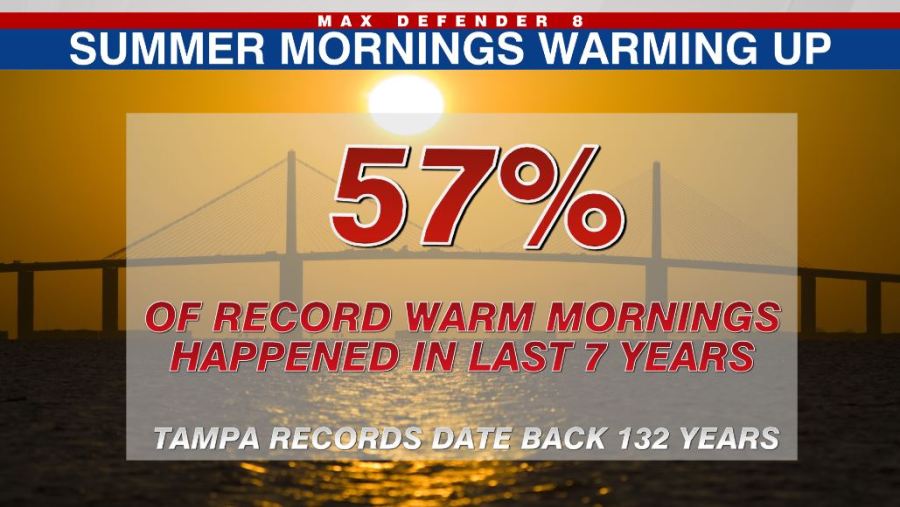TAMPA, Fla. (WFLA) — If you feel this summer has been unusually hot, you’re right. With two months down and one to go, it has been the hottest on record.
The National Weather Service announced that June and July were the two warmest consecutive months in the city’s recorded history. And July was the all-time warmest month on record in Tampa and beyond. With a mean temperature of 86.
3 degrees Fahrenheit at Tampa Airport, the month beat its nearest competitor (September 2018) by a long shot — . 5 degrees. During July 10 records were either tied or broken – mainly morning lows.
And that is not coincidence, it is part of a very robust regional trend. So WFLA’s Climate Specialist Jeff Berardelli decided to dig into the local data. What he uncovered was astonishing.
57 percent of Tampa’s record warm mornings have occurred since 2015. Given that Tampa’s records go back 132 years, the probability of that remarkable statistic being chance is almost non-existent. WFLA Since 1970, Tampa’s morning lows have risen 3.
7 degrees F. That is substantially more than the average daily temperature which has risen by 1. 7 degrees F.
Climate Central So that begs the question, why is the climate, and specifically mornings, warming so fast? There are two answers to that. The first involves something called Urban Heat Island effect. Simply put, urban areas tend to generate and trap more heat.
The more buildings and asphalt an area has, the darker the surfaces are, the more heat is trapped. Climate Central The Tampa Bay Area has grown substantially over the past few decades. Since 1970 the population has grown from approximately 1 million people to 3 million people.
With that comes a more densely built urban area. In Tampa the official temperature is measured at the airport. The airport has also become more built up and as a result some of the extra heat is likely attributable to that.
On a broader scale, climate change is to blame. Summers have substantially warmed all across the Globe and here in the U. S.
due to the increase in heat-trapping greenhouse gases. Climate Central And warmer mornings are playing an outsized role. In the image below, from the first half of July 2022, you can see how climate change has made the majority of warm nights at least twice as likely (and often 5 times more likely) across the southern half of the nation.
So why are nights warming faster than days due to climate change? There are a few reasons, but the main one is extra water vapor in the air. As temperatures warm, the air can hold more water vapor. Water vapor is a greenhouse gas itself.
The extra moisture in the air traps more heat. This is especially true at night. During the day the sun heats the ground and surface air temperatures.
At night that heat radiates back into space. But when more moisture and clouds are present, that heat reradiates back down to the ground, keeping temperatures warm. You can think of it like having a thicker blanket.
window. loadAnvato({“mcp”:”LIN”,”width”:”100%”,”height”:”100%”,”video”:”7889742″,”autoplay”:false,”expect_preroll”:true,”pInstance”:”p1″,”plugins”:{“comscore”:{“clientId”:”6036439″,”c3″:”wfla. com”,”version”:”5.
2. 0″,”useDerivedMetadata”:true,”mapping”:{“c3″:”wfla. com”,”ns_st_st”:”wfla”,”ns_st_pu”:”Nexstar”,”ns_st_ge”:”Weather”,”cs_ucfr”:””}},”dfp”:{“adTagUrl”:”https://pubads.
g. doubleclick. net/gampad/ads?sz=1×1000&iu=/5678/mg.
wfla/news/local_news/landing&impl=s&gdfp_req=1&env=vp&output=vmap&vid=short_onecue&unviewed_position_start=1&ad_rule=1&description_url=https://www. wfla. com/news/local-news/feed/&cust_params=vid%3D7889742%26pers_cid%3Dunknown%26vidcat%3D/news/local_news%26bob_ck%3D[bob_ck_val]%26d_code%3D1%26pagetype%3Dsubindex%26hlmeta%3Dlocal%20news”},”nielsen”:{“apid”:”PF6F249F0-D03A-4863-9CDC-A1A9A1FC2315″,”sfcode”:”dcr”,”type”:”dcr”,”apn”:”Anvato”,”environment”:”production”,”useDerivedMetadata”:true,”mapping”:{“adloadtype”:2,”adModel”:2}},”segmentCustom”:{“script”:”https://segment.
psg. nexstardigital. net/anvato.
js”,”writeKey”:”r8ek1VmgcKfFR0e3ybLT12UdNDdp9UjA”,”pluginsLoadingTimeout”:12}},”accessKey”:”XEaYoy88zvleku6RWLF7Fjpa9Dyj8BPN”,”token”:”eyJ0eXAiOiJKV1QiLCJhbGciOiJIUzI1NiJ9. eyJ2aWQiOiI3ODg5NzQyIiwiaXNzIjoiWEVhWW95ODh6dmxla3U2UldMRjdGanBhOUR5ajhCUE4iLCJleHAiOjE2NTk2NzMzMjZ9. 40KLYcCSeAP9AzKl-YePLDcw5q9M_3fk_6BbYsTTAZ0″,”expectPrerollTimeout”:8,”nxs”:{“mp4Url”:”https://tkx.
mp. lura. live/rest/v2/mcp/video/7889742?anvack=Rawk5AaXd3LVZIRoV3uerCkdB3KQ0dnD&token=%7E6SCxeJQDb0S5PyhRYVqmWrloGseZvo70MQ%3D%3D”,”enableFloatingPlayer”:true},”disableMutedAutoplay”:false,”recommendations”:false,”expectPreroll”:true,”titleVisible”:true,”pauseOnClick”:true,”trackTimePeriod”:60,”isPermutiveEnabled”:true}); The bottom line is, as temperatures continue to warm due to human-caused climate change, we should expect these record breaking summers to only get hotter.
.
From: wfla
URL: https://www.wfla.com/weather/climate-classroom/tampa-on-track-for-its-hottest-summer-on-record/
